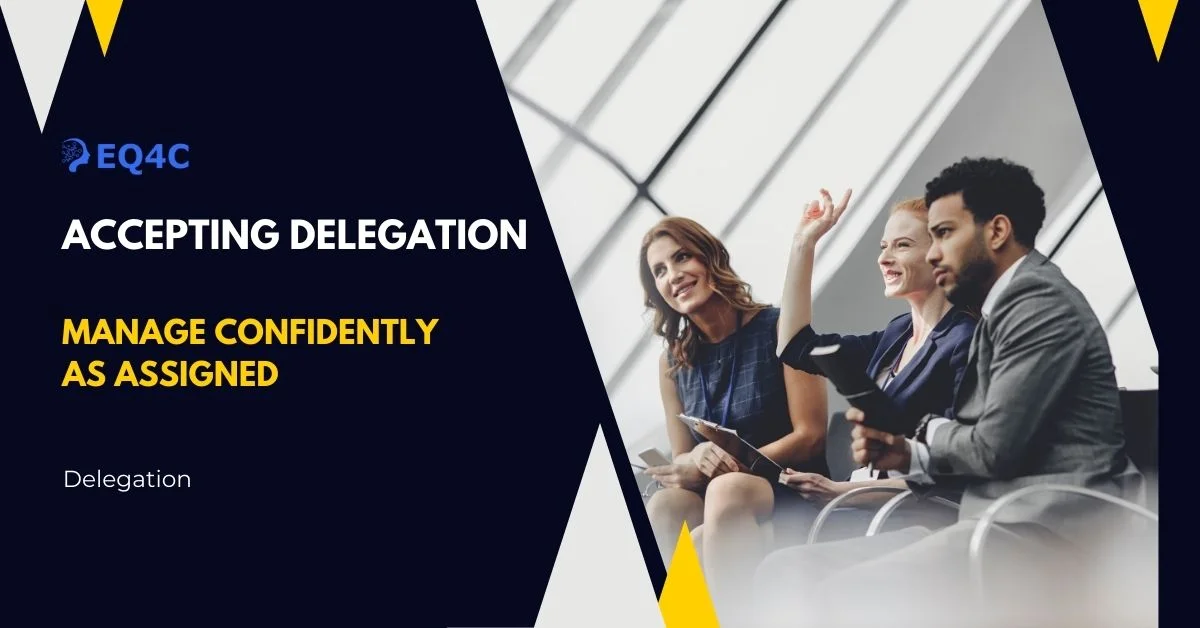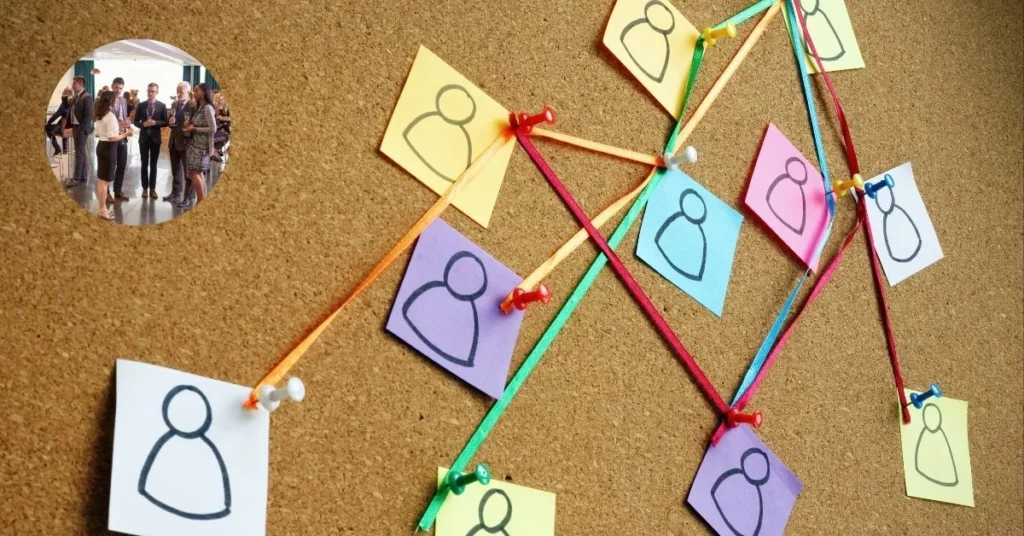Accepting Delegation: Manage Confidently as Assigned
By embracing delegation, you can unlock the full potential of your team and achieve remarkable results.

Have you ever felt overwhelmed by the workload and struggled to meet deadlines? Do you find it challenging to accept tasks assigned to you? If so, you are not alone. Many individuals find it difficult to manage assigned tasks and feel uncertain about accepting delegation.
In this article, we will explore the importance of accepting delegation and how to manage it confidently when tasks are assigned to you. Delegation is a crucial skill for effective leadership and can greatly enhance productivity and efficiency in the workplace.
So, how can you overcome your hesitation and become proficient in managing delegated tasks? Let’s dive in and discover the strategies and techniques that will empower you to handle assigned tasks confidently and efficiently.
Key Takeaways:
- Delegation is an essential skill for effective leadership.
- Accepting delegation enhances productivity and efficiency in the workplace.
- Understanding the delegation process is crucial before accepting tasks.
- Assessing your own delegation skills will help improve your ability to handle assigned tasks.
- Building trust with your delegator fosters effective communication.
Understanding the Delegation Process
In order to effectively accept and manage delegation, it is crucial to understand the delegation process and the strategies that contribute to its success. By comprehending how delegation works and implementing the right techniques, you can ensure smooth task assignments and optimum productivity.
The delegation process involves several key steps that help in the efficient transfer of responsibilities:
- Identify the task: Clearly define the task at hand, ensuring that it is specific, manageable, and aligns with the delegatee’s skill set.
- Select the right person: Evaluate the skills and capabilities of potential delegatees to determine the most suitable individual for the task.
- Provide clear instructions: Clearly communicate the expectations, goals, and deadlines associated with the delegated task to avoid any confusion.
- Delegate authority: Grant the necessary authority to the delegatee, empowering them to make decisions and take actions related to the assigned task.
- Offer support and resources: Provide the delegatee with the required resources, guidance, and support to ensure their success in accomplishing the task.
- Monitor progress: Keep track of the delegatee’s progress and provide feedback, guidance, and assistance as needed.
- Evaluate outcomes: Assess the performance of the delegatee and the outcome of the delegated task, offering constructive feedback and recognition.
The delegation process may vary depending on the organization, the complexity of the task, and the individuals involved. However, by adhering to these key steps, you can create a structured and effective delegation process that promotes collaboration and maximizes results.
Effective delegation strategies can further enhance the delegation process. These strategies include:
- Understanding the strengths and weaknesses of the delegatee to assign tasks accordingly and provide appropriate support.
- Ensuring open and transparent communication between the delegator and delegatee to establish clarity and foster trust.
- Setting realistic deadlines and expectations to ensure the successful completion of tasks without overwhelming the delegatee.
- Providing opportunities for skill development and growth through delegated tasks that challenge and motivate the individual.
“Effective delegation is not about simply assigning tasks; it’s about empowering others to take ownership and achieve collective success.” – Unknown
| Delegation Process | Delegation Strategies |
|---|---|
| 1. Identify the task | 1. Understanding delegatee’s strengths and weaknesses |
| 2. Select the right person | 2. Ensuring open and transparent communication |
| 3. Provide clear instructions | 3. Setting realistic deadlines and expectations |
| 4. Delegate authority | 4. Providing opportunities for skill development and growth |
| 5. Offer support and resources | |
| 6. Monitor progress | |
| 7. Evaluate outcomes |
By understanding the delegation process and utilizing effective delegation strategies, you can cultivate a culture of trust, collaboration, and productivity within your team or organization. This will not only facilitate successful task completion but also contribute to the overall growth and success of the team.
Assessing Your Ability to Accept Delegation
Successful delegation requires a thorough assessment of your delegation skills and techniques. By evaluating your strengths and weaknesses, you can improve your ability to handle assigned tasks effectively. Here are some steps to help you assess your delegation skills:
- Identify your strengths: Take note of the areas where you excel in delegation. Are you good at assigning tasks, providing clear instructions, or following up on progress? Recognizing your strengths will give you confidence in accepting delegated tasks.
- Recognize your weaknesses: Be honest with yourself about areas where you struggle in delegation. Are you hesitant to let go of control, or do you find it difficult to trust others with important tasks? Acknowledging your weaknesses will allow you to work on improving them.
- Seek feedback: Ask for input from trusted colleagues or supervisors who have observed your delegation skills. Their insights can provide valuable perspectives on areas where you may need to develop or refine your techniques.
Understanding your delegation skills and techniques will enable you to take proactive steps towards improving your ability to handle assigned tasks confidently. It’s essential to continuously evaluate and enhance your delegation skills to ensure effective delegation and successful task completion.
“Evaluating your delegation skills is an important part of your professional growth. By recognizing your strengths and weaknesses, you can refine your techniques and become a more effective leader.” – David Smith, CEO of ABC Company
Advertisement
Assessing your ability to accept delegation is a critical step towards becoming a skilled delegator. By identifying your strengths and weaknesses and seeking feedback, you can develop a robust set of delegation skills that will empower you to handle assigned tasks with confidence.
Assessment of Delegation Skills
| Delegation Skill | Strengths | Weaknesses |
|---|---|---|
| Assigning tasks effectively | Clear communication, understanding team members’ capabilities | Reluctance to delegate complex or critical tasks |
| Providing clear instructions | Concise and comprehensive instructions | Tendency to overwhelm with excessive details |
| Following up on progress | Regular check-ins, addressing roadblocks | Inconsistent follow-up, lack of accountability |
Overcoming Challenges in Delegation
Delegation, although beneficial, can present its fair share of challenges. However, with the right strategies and best practices, you can overcome these obstacles and ensure effective delegation. In this section, I will discuss some key approaches to conquer the challenges that may arise when accepting delegated tasks.
1. Clearly Communicate Expectations
One common challenge in delegation is the lack of clear expectations. Ambiguity can lead to confusion and misunderstandings, resulting in inefficiencies. To overcome this, it is crucial to communicate expectations with your delegator. Be specific about the desired outcomes, deadlines, and any specific guidelines or preferences. This will ensure that both parties are on the same page and minimize the chances of miscommunication.
2. Provide Adequate Resources and Support
Another challenge that often arises in delegation is the lack of sufficient resources or support. To address this, it is important to identify and provide the necessary resources and support to successfully complete the delegated tasks. This may include access to information, tools, training, or assistance from other team members. By ensuring that the resources and support are readily available, you can enable the smooth execution of the assigned tasks.
3. Delegate According to Skills and Expertise
Effective delegation involves assigning tasks to individuals with the appropriate skills and expertise. Sometimes, the challenge lies in matching the right person with the right task. To overcome this, take the time to assess the capabilities and strengths of your team members. By delegating tasks that align with their skills, you can maximize productivity and ensure the successful completion of the assigned tasks.
4. Foster Trust and Open Communication
Trust and open communication are integral to successful delegation. Challenges can arise when there is a lack of trust or when communication channels are not open. To mitigate this, focus on building trust with your delegator by demonstrating reliability, integrity, and accountability. Additionally, encourage open communication channels, allowing for clear and regular feedback. By fostering trust and open communication, you can establish a strong foundation for effective delegation.
Implementing these best practices and strategies will help you overcome the challenges that may arise in delegation. By effectively managing these obstacles, you can ensure smooth collaboration, increased productivity, and successful completion of delegated tasks.
Building Trust with Your Delegator
Trust is the foundation of successful delegation in the workplace. When you establish trust with your delegator, you create a positive working relationship that fosters effective communication, collaboration, and task completion. Here are some strategies to help you build trust:
1. Open and Honest Communication
Engage in open and honest communication with your delegator. Clearly communicate your abilities, availability, and any concerns or questions you may have about the delegated task. This transparent communication will build trust and ensure that both parties are on the same page.
2. Demonstrate Reliability
Show your delegator that they can rely on you to complete delegated tasks effectively and within the given timeframe. Be punctual, meet deadlines, and deliver high-quality work. Consistently demonstrating your reliability will build trust and confidence in your abilities.
3. Seek and Accept Feedback
Be open to receiving feedback from your delegator. Actively seek feedback on your progress, performance, and areas for improvement. By embracing feedback, you show your commitment to personal and professional growth, which builds trust and credibility.
4. Deliver Results
Achieve successful outcomes in the tasks assigned to you. Strive for excellence and go the extra mile to deliver exceptional results. When you consistently produce high-quality work, your delegator will trust your abilities and rely on you for future delegations.
5. Be Proactive
Take initiative in the delegation process by anticipating needs and taking proactive steps to ensure the smooth execution of the assigned tasks. This proactive approach demonstrates your commitment to the success of the delegated project and builds trust in your ability to handle responsibilities independently.
“Trust is the glue of life. It’s the most essential ingredient in effective communication. It’s the foundational principle that holds all relationships.” – Stephen Covey
Setting Clear Expectations
One of the key factors in successful delegation is setting clear expectations with your delegator. When both parties are on the same page regarding task assignments, it promotes a productive and efficient working relationship. To ensure clarity and avoid misunderstandings, consider implementing the following techniques:
- Define the task: Start by discussing the task in detail with your delegator. Understand the specific goals, desired outcomes, and any deadlines or milestones associated with the task. Inquire about any specific requirements or expectations that need to be met.
- Clarify responsibilities: Clearly define the responsibilities of both parties involved in the task. Discuss who will be responsible for what aspects of the task and establish boundaries to avoid overlap or confusion.
- Specify deliverables: Determine the expected deliverables or results of the task. Clearly communicate what needs to be achieved and any specific formats or guidelines that need to be followed. This ensures that the delegator’s expectations align with what you deliver.
- Discuss timelines: Establish a timeline for the task, including any interim milestones or deadlines. Ensure that both parties are aware of the timeframes involved and discuss any potential scheduling conflicts or constraints upfront.
- Address communication preferences: Discuss how communication will occur throughout the task. Clarify preferred communication channels, frequency of progress updates, and any specific reporting requirements. This helps ensure that the delegator receives the information they need in a manner that suits their preferences.
By implementing these techniques, you can set clear expectations with your delegator, minimizing the possibility of misunderstandings and maximizing the chances of a successful delegation process. Properly understanding the task, defining responsibilities, specifying deliverables, discussing timelines, and addressing communication preferences will foster a productive and collaborative environment, enhancing the overall effectiveness of the delegation process.
Effective Communication in Delegation
When it comes to delegation, effective communication is crucial for a successful outcome. By employing best practices in communication, you can effectively manage delegated tasks with confidence while ensuring clarity between you and your delegator.
Here are some key techniques to enhance communication during the delegation process:
- Active Listening: Actively listen to your delegator to fully grasp the task requirements, expectations, and any specific instructions. Show engagement by asking clarifying questions and seeking further information.
- Clarify Roles and Responsibilities: Clearly define roles, responsibilities, and deliverables with your delegator to minimize misunderstandings. This ensures that both parties have a clear understanding of what is expected.
- Establish Regular Check-Ins: Schedule regular check-ins with your delegator to provide progress updates and address any questions or concerns. This fosters open communication and allows for timely adjustments if needed.
- Use Clear and Concise Language: Avoid jargon or technical terms that may create confusion. Use simple and concise language to convey your points effectively.
Effective communication is not just about speaking; it also involves active listening, clarifying expectations, and maintaining regular communication throughout the delegation process.
By following these communication best practices, you can improve delegation effectiveness and maintain a strong working relationship with your delegator. Effective communication ensures that everyone involved is on the same page, leading to successful task completion and overall productivity.
Next, we will explore techniques for managing delegated tasks and meeting deadlines, further strengthening your delegation skills. Stay tuned!
| Communication Techniques in Delegation | Benefits |
|---|---|
| Active listening | – Better understanding of task requirements – Reduced misunderstandings – Improved collaboration |
| Role clarification | – Clear understanding of responsibilities – Minimized confusion – Efficient task execution |
| Regular check-ins | – Timely updates on progress – Addressing concerns promptly – Opportunity for adjustments |
| Clear and concise language | – Minimized misinterpretation – Enhanced clarity – Improved communication flow |
Managing Delegated Tasks and Deadlines
When it comes to delegation, effectively managing tasks and meeting deadlines is crucial for ensuring productivity and success. By prioritizing, organizing, and staying on track with assigned tasks, you can confidently handle delegation and contribute to the overall efficiency of the team and organization.

Here are some strategies to help you effectively manage delegated tasks:
- Prioritize your tasks: Start by assessing the urgency and importance of each task. This will help you determine the order in which they should be completed.
- Break down tasks: If a delegated task seems overwhelming, break it down into smaller, more manageable sub-tasks. This will make it easier to focus and accomplish each part of the task.
- Create a timeline: Set realistic deadlines for each task and create a timeline to track your progress. This will help you stay organized and ensure that you’re on schedule.
- Use task management tools: Consider using digital tools or apps to manage your tasks, deadlines, and reminders. These tools can help you stay organized and ensure that nothing falls through the cracks.
- Communicate regularly: Keep open lines of communication with your delegator or team members. Regularly update them on your progress, ask for clarification if needed, and seek feedback to ensure that you’re on the right track.
“Effective task management is vital for successful delegation. By prioritizing, organizing, and maintaining clear communication, you can confidently handle delegated tasks and deliver results.”
Incorporating these strategies into your delegation process will help you manage delegated tasks confidently and ensure that you meet deadlines effectively. By staying organized and communicating effectively, you can contribute to the overall success of the team and achieve optimal results.
| Benefits of Effective Task Management in Delegation | Challenges to Overcome |
|---|---|
|
|
Seeking Support and Collaboration
Delegation is not a solitary endeavor. In fact, seeking support and collaboration is an essential aspect of the delegation process. By involving others, you can tap into their expertise and resources, ultimately contributing to the successful completion of delegated tasks.
Here are some delegation strategies and tips to seek support and collaboration:
- Identify key stakeholders: Determine who are the individuals or teams that can provide valuable assistance in completing the delegated tasks. These stakeholders can be subject matter experts, colleagues with complementary skills, or even external resources.
- Communicate your needs: Clearly articulate the specific support you require from each stakeholder. Precise instructions and open communication ensure that everyone understands their roles and responsibilities in the delegated tasks.
- Delegate authority: To foster collaboration, delegate certain decision-making authority to your support network. By empowering them to make decisions within the defined scope, you foster a sense of ownership and encourage innovative solutions.
- Establish regular check-ins: Schedule regular meetings or progress updates to stay connected with your support network. These check-ins provide opportunities to address any challenges or roadblocks that may arise and ensure that the delegated tasks are on track.
- Encourage feedback: Create an environment that encourages open feedback and suggestions from your support network. By listening to their insights and ideas, you can enhance the quality of the delegated tasks and foster a culture of continuous improvement.
- Recognize and appreciate: Show gratitude and recognize the contributions of your support network. Acknowledging their efforts and expressing gratitude goes a long way in building strong working relationships and fostering a collaborative culture.
By seeking support and collaboration, you not only lighten your workload but also foster a sense of shared ownership and accountability. Together, you can achieve more and deliver exceptional results.
“Alone we can do so little; together we can do so much.” – Helen Keller
| Benefits of Seeking Support and Collaboration in Delegation | Strategies and Tips |
|---|---|
| 1. Utilize diverse expertise and resources | 1. Identify key stakeholders |
| 2. Foster innovation and creative solutions | 2. Communicate your needs |
| 3. Share the workload and increase efficiency | 3. Delegate authority |
| 4. Build strong working relationships | 4. Establish regular check-ins |
| 5. Enhance the quality of delegated tasks | 5. Encourage feedback |
| 6. Foster a culture of collaboration and continuous improvement | 6. Recognize and appreciate |
Overcoming Delegation Anxiety
Accepting delegation can sometimes bring about feelings of anxiety. As responsibilities are passed onto you, it’s normal to feel overwhelmed or unsure of your capabilities. However, with the right techniques and mindset, you can overcome delegation anxiety and build confidence in managing assigned tasks.
Acknowledge Your Abilities
In order to overcome delegation anxiety, start by acknowledging your abilities and strengths. Remind yourself of past successes and instances where you handled tasks effectively. Understand that you have been entrusted with these tasks because of your skills and expertise.
Identify the Root Cause
Analyze the root cause of your anxiety. Are you afraid of making mistakes, or do you worry about meeting expectations? Understanding the underlying reasons for your anxiety can help you address them directly and find appropriate solutions.
Communicate Your Concerns
Don’t hesitate to communicate your concerns and anxieties with your delegator. Open and honest communication can help alleviate anxiety by clarifying expectations, gaining reassurance, and receiving valuable guidance and support.
Break It Down
Large, complex tasks can be overwhelming, leading to delegation anxiety. Break them down into smaller, more manageable tasks. This will not only make the workload seem more achievable but also reduce anxiety and provide a sense of progress as you complete each subtask.
Seek Feedback
Seek feedback from your delegator and colleagues after completing delegated tasks. Constructive feedback will not only help you improve but also boost your confidence in handling future assignments. Remember that feedback is an opportunity for growth, not criticism.
Focus on Learning and Growth
Shift your mindset from viewing delegation as a burden to seeing it as an opportunity for learning and growth. Embrace the challenge and consider how each new task can expand your skills and knowledge. This shift in perspective can help alleviate anxiety and build confidence.
Practice Self-Care
Take care of yourself both physically and mentally. Engage in activities that reduce stress, such as exercise, mindfulness, or hobbies. Prioritize self-care to maintain a clear and focused mindset, enabling you to approach delegated tasks with confidence.
Visualize Success
Use visualization techniques to imagine yourself successfully completing delegated tasks. Visualize each step of the process, envisioning positive outcomes and feelings of accomplishment. This visualization can help reduce anxiety and increase your belief in your ability to handle assigned tasks.
Take Action
Ultimately, the best way to overcome delegation anxiety is to take action and dive into the assigned tasks. With each completed task, you will gain experience, knowledge, and confidence. Remember, practice makes perfect.
| Techniques for Overcoming Delegation Anxiety |
|---|
| Acknowledge your abilities |
| Identify the root cause of anxiety |
| Communicate concerns with your delegator |
| Break down tasks into smaller, manageable steps |
| Seek feedback and learn from it |
| Shift your mindset to view delegation as an opportunity for growth |
| Prioritize self-care |
| Visualize success |
| Take action and complete assigned tasks |
Conclusion
In conclusion, accepting delegation and managing tasks confidently when assigned is crucial for personal and professional growth. By understanding the delegation process, building trust, setting clear expectations, communicating effectively, and seeking support, I can become a master of delegation and enhance my leadership skills.
Embracing delegation not only benefits me personally but also empowers my team and contributes to overall organizational success. By delegating tasks effectively, I can optimize productivity and efficiency in the workplace, creating a positive and collaborative work environment.
Delegation is a key skill for effective leadership, allowing me to focus on strategic priorities, develop the skills of team members, and promote innovation within my organization. By embracing delegation, I can unlock the full potential of my team and achieve remarkable results.
FAQ
Why is accepting delegation important?
Accepting delegation is important as it allows you to contribute to the overall goals and objectives of your team or organization. It shows that you are a reliable and responsible team member who can handle the assigned tasks effectively.
How can I manage delegation confidently?
Managing delegation confidently involves understanding your own delegation skills and techniques, setting clear expectations with your delegator, communicating effectively, and seeking support when needed. It is essential to prioritize tasks, meet deadlines, and effectively collaborate with your delegator and team members.
What is the delegation process?
The delegation process involves identifying tasks that can be delegated, selecting the right person for the task, clearly communicating the task’s objectives and expectations, providing necessary resources, monitoring progress, and providing feedback and support throughout the task completion.
How can I assess my ability to accept delegation?
To assess your ability to accept delegation, you can evaluate your delegation skills, such as your ability to prioritize tasks, communicate effectively, and meet deadlines. You can also reflect on your past experiences with delegation and identify areas for improvement.
What are some common challenges in delegation?
Common challenges in delegation include lack of communication, unclear expectations, insufficient resources, micromanagement, and fear of relinquishing control. By following best practices and utilizing effective delegation strategies, these challenges can be overcome.
How can I build trust with my delegator?
Building trust with your delegator can be achieved through open and transparent communication, consistently meeting expectations, demonstrating competence, and showing accountability for the tasks assigned to you. Trust is fostered through mutual respect and reliability.
Why are clear expectations important in delegation?
Clear expectations in delegation ensure that both you and your delegator have a thorough understanding of what needs to be accomplished, by when, and to what standard. They provide a solid foundation for successful task completion and minimize misunderstandings.
How can I communicate effectively in delegation?
Effective communication in delegation involves active listening, asking clarifying questions, providing regular progress updates, seeking feedback, and addressing any concerns or challenges that may arise during the delegation process.
How can I manage delegated tasks and deadlines?
To manage delegated tasks and deadlines effectively, it is crucial to prioritize tasks based on their importance and deadline, create a schedule or to-do list, break larger tasks into smaller achievable milestones, and regularly review and adjust your plan as needed.
Why is seeking support and collaboration important in delegation?
Seeking support and collaboration in delegation promotes a team-oriented approach to task completion. It enables you to leverage the skills and expertise of others, fosters open communication, and creates a conducive environment for shared goals and successes.
How can I overcome delegation anxiety?
Overcoming delegation anxiety can be achieved by building trust with your delegator, improving your delegation skills, seeking guidance and feedback from others, and reframing your mindset to view delegation as an opportunity for growth and development.



